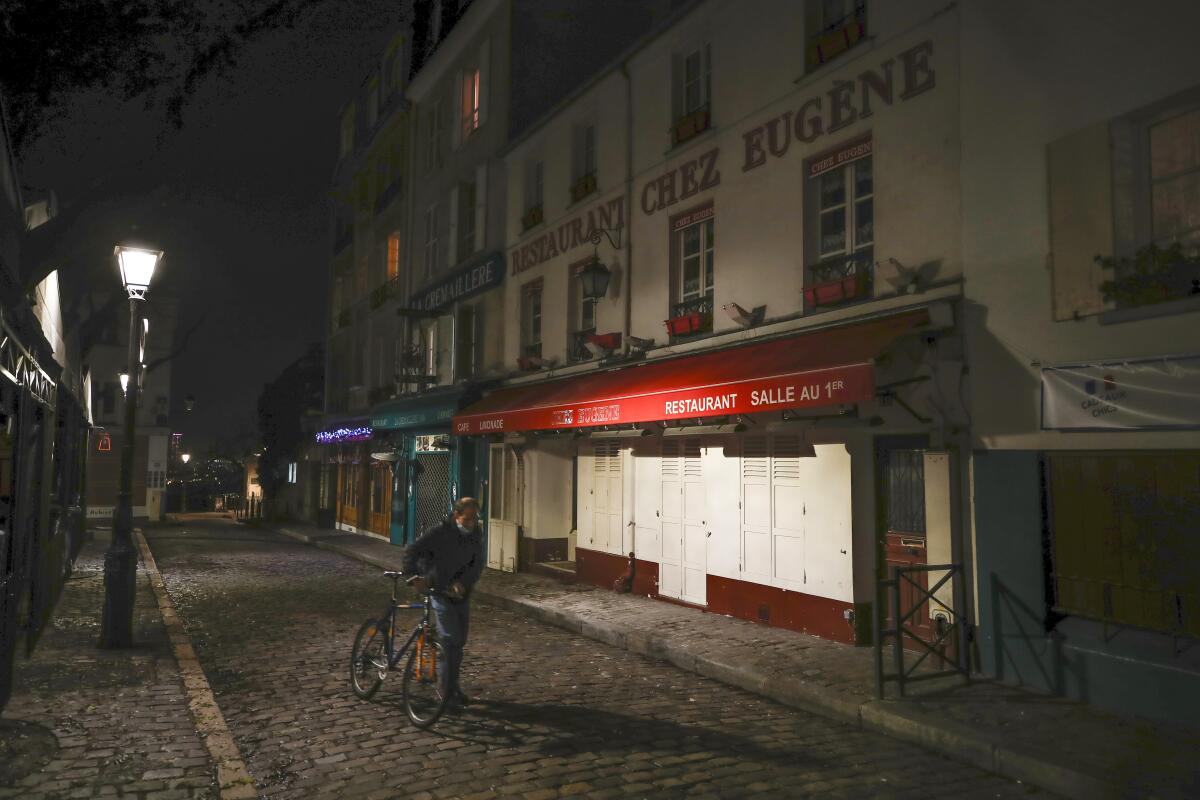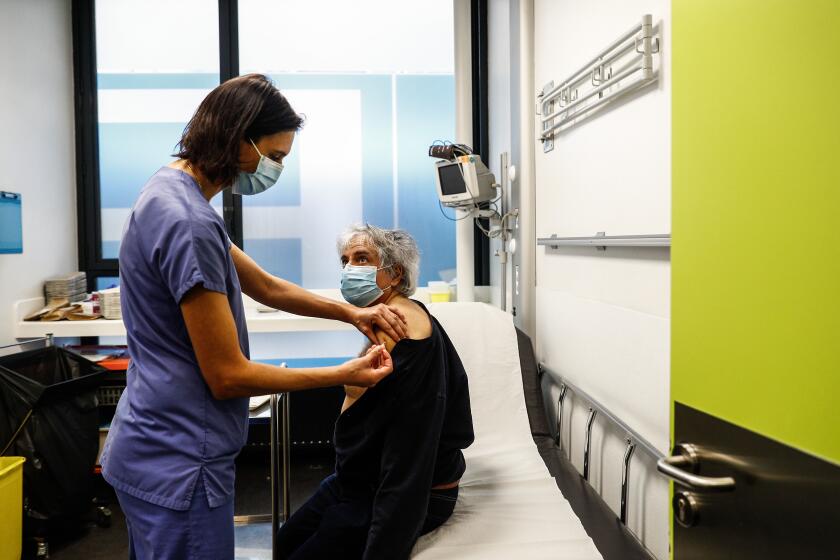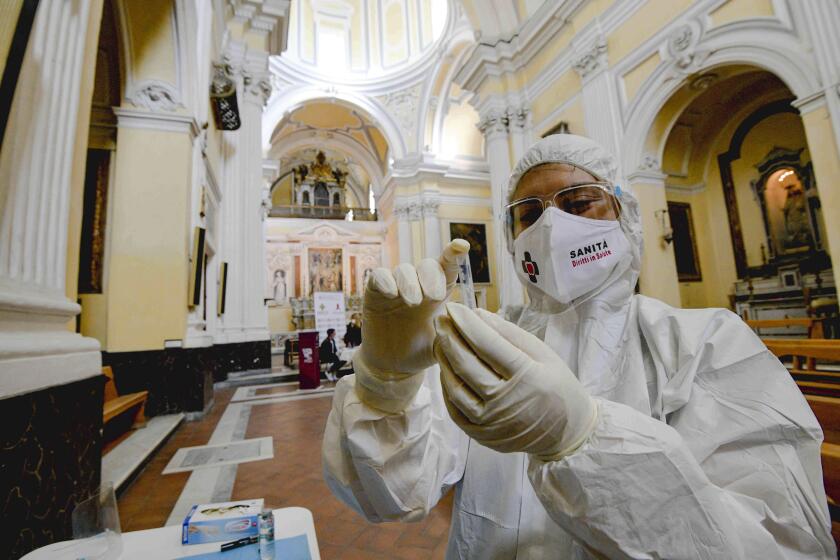‘At 6 p.m., life stops’: Europe turns to curfews to fight coronavirus

- Share via
PARIS — As the wan winter sun sets over France’s Champagne region, the countdown clock kicks in.
Laborers stop pruning vines as the light fades about 4:30 p.m., leaving them 90 minutes to come in from the cold, change out of their work clothes, hop in their cars and zoom home before a 6 p.m. coronavirus curfew.
Forget about after-work socializing with friends, after-school clubs for children or evening shopping beyond quick trips for essentials. Police on patrol demand valid reasons from people out and about. For those without them, the threat of mounting fines for curfew breakers is increasingly making life in a pandemic even harder.
“At 6 p.m., life stops,” says Champagne producer Alexandre Prat.
Trying to fend off the need for a third nationwide lockdown that would further dent Europe’s second-largest economy and put more jobs in danger, France is instead opting for expanding curfews. Big chunks of eastern France, including most of its regions that border Belgium, Germany, Switzerland and Italy, face restrictions on movement from 6 p.m. to 6 a.m. At 12 hours, the curfew is the longest anywhere in the European Union’s 27 nations.
Starting Saturday, the rest of France will follow suit. The prime minister announced Thursday an extension of the 6 p.m.-to-6 a.m. curfew to cover the whole country, including zones where the nightly deadline for getting home hadn’t started until 8 p.m.
French shops will have to close at 6 p.m. Outdoor activities will stop, with the exception of quick walks for pets. Workers will need employers’ notes to commute or move around for work after curfew.
Those who have lived with the longer curfew for the last couple of weeks say it’s often bad for business and for what remained of their anemic social lives during the pandemic.
The French are among the most reluctant people in the world to get a COVID-19 shot because of distrust of the government and past health scandals.
Until a couple of weeks ago, the nightly curfew didn’t kick in until 8 p.m. in Prat’s region, the Marne. Customers still stopped by to buy bottles of his family’s bubbly wines on their way home, he said. But when the cutoff time was advanced to 6 p.m. to slow coronavirus infections, the drinkers disappeared.
“Now we have no one,” Prat said.
The village where retiree Jerome Brunault lives alone in the Burgundy wine region is also in one of the 6 p.m. curfew zones. The 67-year-old says his solitude weighs more heavily without the opportunity for early-evening drinks, nibbles and chats with friends, the so-called apéro get-togethers so beloved by the French that were more hurried but still feasible when curfew started two hours later.
“With the 6 p.m. curfew, we cannot go to see friends for a drink anymore,” Brunault said. “I now spend my days not talking to anyone except for the baker and some people by phone.”
France has recorded over 1 million confirmed coronavirus cases since the pandemic’s start, the second country in Western Europe to reach that number.
By extending the 6 p.m. curfew nationwide, for at least 15 days, the government aims to limit infections in the country that has seen over 69,000 known COVID-19 deaths. It also wants to slow the spread of a particularly contagious virus variant that has swept across neighboring Britain, where new infections and virus deaths have soared.
An earlier curfew combats transmission “precisely because it serves to limit social interactions that people can have at the end of the day — for example, in private homes,” French government spokesman Gabriel Attal said.
Curfews elsewhere in Europe all start later and often finish earlier.
Almost half of the roughly 4 million new coronavirus cases tallied globally last week were in Europe, the World Health Organization says.
The curfew in Italy runs from 10 p.m. to 5 a.m., as does the curfew in Latvia that extends from Friday night to Sunday morning. Parts of Belgium have a 10 p.m.-to-6 a.m. curfew.
People out between 8 p.m. and 5 a.m. in Hungary must be able to show police written proof from their employers that they are either working or commuting.
There are no curfews in Bulgaria, Croatia, Denmark, Estonia, Finland, Ireland, Lithuania, Malta, Sweden, Poland or the Netherlands, although the Dutch government is thinking about imposing a curfew.
In France, critics of the 6 p.m. curfew say the earlier time actually crams people together more after work, when they pile onto public transportation, clog roads and shop for groceries in a narrow rush-hour window before they must be home.
Women’s rugby coach Felicie Guinot says negotiating rush-hour traffic in Marseille has become a nightmare. The city in southern France is among the places where the more contagious coronavirus variant has started to flare.
“It’s a scramble so everyone can be home by 6 p.m.,” Guinot said.
In historic Besancon, the fortressed city that was the hometown of “Les Miserables” author Victor Hugo, music store owner Jean-Charles Valley says the 6 p.m. deadline means people no longer drop by after work to play with the guitars and other instruments he sells. Instead, they rush home.
“People are completely demoralized,” Valley said.
More than 20,000 villagers were taken by bus to centralized quarantine as China seeks to stem a new coronavirus outbreak in Hebei province.
In Dijon, the French city known for its pungent mustard, working mother of two Celine Bourdin said her life has narrowed to “dropping kids at school and going to work, then going back home, helping kids with homework and preparing dinner.”
But even that cycle is better than a repeat of France’s lockdown at the start of the pandemic, when schools also closed, Bourdin said.
“If my children don’t go to school, it means I cannot work anymore,” she said. “It was terribly difficult to be all stuck almost 24 hours a day in the house.”
More to Read
Sign up for Essential California
The most important California stories and recommendations in your inbox every morning.
You may occasionally receive promotional content from the Los Angeles Times.













